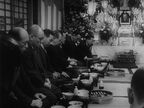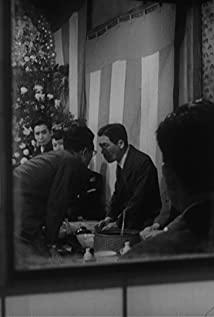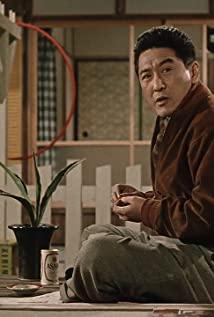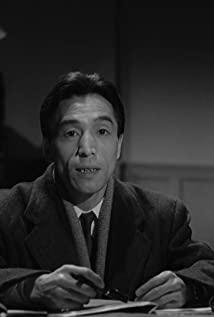1. Institution Kanji
Watanabe, the protagonist of the movie, is the chief of the Citizens Section of a government department. One of his most outstanding achievements is that he has never asked for a leave of absence in his thirty years of work. But at the beginning of the film, a joke read by Oda, an office worker, satirized his astonishing "performance". As the young girl Oda's laughter was so abrupt in the dead office, she was asked to read the joke to everyone. So she read: "Q: It is said that you have never asked for leave, so the city government can't do without you! Answer: No, I'm afraid the city government knows that it can be done without me."
After reading Oda's joke, everyone in the office felt that Embarrassed, they took a peek at Watanabe at the other end of the table, then lowered their heads and continued to work. Watanabe didn't say anything after hearing the joke, just silently bowed his head and stamped it again. At this point the film's voiceover begins: "This man (Watanabe) actually died twenty years ago. He was alive when he first worked and wanted to do something. But then his enthusiasm faded away in the city hall. It was a pointless hustle. Then he didn't do anything except keep his position..."
At the beginning of the movie, Watanabe just pushed a group of women who complained about environmental sewage problems to the civil engineering department, and then the civil engineering department pushed it to the civil engineering department. The Parks Section, and the Parks Section pushed it to the Health Department...then the ball rolled all over the dozen or so departments of the city government, and was finally kicked back to the Citizens Section.
The so-called "do nothing, you will not do anything wrong", everyone doesn't want to take matters into their own hands, so blaming each other has become a self-evident tacit understanding of all departments. The film reflects the Japanese government system in the post-war 50s, but we don't look at all unfamiliar. This phenomenon is very similar to our interpretation of the work attitudes of most workers in the system (now called civil servants). In the minds of the general public, these people who work in the system do not do anything practical, and many of them can even spend a day with "a cup of tea, a cigarette, and a newspaper for half a day". Of course, times have changed, and now you may not read newspapers, but instead use mobile phones and computers. Even busy, as said in the movie, are some boring things that I don't know.
In fact, not everyone wants to count the hours off work, but the bureaucracy and corruption in the system gradually wear away the spirit of young people. Watanabe in the movie also wanted to improve the efficiency of office work more than 20 years ago, but then he became a "mummy" in people's eyes, an empty shell that seemed to have no inner life soul. Chinese writer Liu Zhenyun's early works "Unit" and "Chicken Feather in One Place" also talked about the harm caused by similar institutional shackles to people.
2. Psychological upheaval of life from death
What can turn a person upside down? Sickness, car accident, the death of a loved one, etc., all the experiences of near-death should be the easiest to rethink life. Because in most people's understanding, death is the end of everything. No matter how beautiful you were in the world, or how humble you were, you can't take anything with you. All the struggles and confusions in life, and even the flies and dogs, will feel meaningless at the moment of death. Just like Watanabe in the movie, when he first learned that he had stomach cancer, he felt like he had not lived for decades in his life.
█ Failed to look forward to family affection
When he learned of his illness, it was late when he returned home, but he did not turn on the lights. The son and daughter-in-law returned from outside the house and they discussed plans to use his pension to build a new house. The daughter-in-law said: "Can the master agree?" The son replied: "If you don't agree, you will threaten to move away. He will not bring the money into the coffin." After saying these words, they turned on the lights, but were surprised to find that their father was sitting in the house in a daze.
After walking out of his son's room, Watanabe stared at his wife's portrait in his room alone, and the sound of "Dad" in his ear made him extremely happy. When he was walking upstairs, his son's icy command "let's rest early, please lock the door downstairs" made him froze in place. After locking the door, Watanabe couldn't help but think of his son Koon's teenage attachment to him. But now, he has become a superfluous person in this family. He tried several times to seize this affection, but found that his son was getting farther and farther away from him.
█ Compensation
for Carnival He has lived for his children for decades, and the certificate above his head is like a joke. To this end, the film first gave Meng being crying a panoramic shot of him and the certificate, and then gave a close-up shot of the certificate. For several days, he didn't go to work or ask for leave. He thought hard about why he lived to such an age? He was ashamed that he had never even had a drink with his own money in all those years before. In the tavern, he bought expensive wine for the first time. Although it is not drinkable and painful, I feel very happy. He let the kitsch writers he met in the tavern take him to have fun, and he wanted to spend decades of savings all at once.
The writer was very moved by Watanabe's introspection and resistance to his past before his death, and he took Watanabe to one place after another where he was intoxicated. But amid the flashy din, Watanabe multiplied his grief. He couldn't help but sang the song "How Short Life is" with the accompaniment in the corner, the crowd suddenly quieted down, and they turned their heads to listen to the lonely old man's soulful singing. Watanabe sang to the end and wept, youth is too distant memory for him.
█ Love for fresh life
So when Oda came to him with a lively and cheerful atmosphere, he was very obsessed with the vitality of Oda. Oda is a girl who loves to laugh and is a little squeamish. After staying for a year and a half, she found that nothing new happened in the unit, so she decided to resign. This is in stark contrast to Watanabe, who hasn't taken leave for 30 years. Watanabe looked at the girl in front of him who was jumping around for a new pair of stockings, and he felt very fond of it. He took Oda to eat, drink and have fun all day. Then I felt that it was not enough, so I made appointments with Oda for several days.
I especially understand his feelings for Oda. He didn't have any intentions for Oda, he just liked the innate enthusiasm in Oda. His past life lacked this kind of anger, so he tried to feel this magic power from Oda, even if it was just to watch her eat and drink greedily. But after a few days, even Oda, who had no scheming, felt a little awkward, so Oda refused to see Watanabe again.
█ Determination to change
Oda is not a thoughtful girl, but she has a natural energy. When Watanabe asked her desperately, "Teach me, how can I be like you?" Oda was frightened by the excited Watanabe, and she answered inexplicably, "I just work and eat." After panicking, Oda took The toy rabbit made in the factory said to Watanabe: "I make toys as if I am making friends with children all over Japan", and then she casually said, "Why don't you do something too."
Just such a common sentence started Watanabe. According to his habitual thinking, at first he felt stunned that as long as he was still in the city hall, he could do nothing. But in fact, it's not really impossible to do anything in the city hall, everyone is just used to not offending people, used to pretending to be deaf and dumb, and used to adapt to the situation. So when Watanabe realized that he could do something, his eyes lit up, he picked up the toy rabbit on the table and suddenly got up and went downstairs.
3. Drama Life on the Wake Night
█ Flashback Technique
The second half of the movie mainly revolves around Watanabe's Wake Night. Regarding the specific changes of Watanabe during his lifetime, the movie is filled and perfected by everyone's memories of Watanabe's lifetime. Originally, the movie could have completed the story of Watanabe in a sequential manner. However, this way of flashbacks, on the one hand, disrupts the original rhythm of the movie, making the movie more suspenseful; on the other hand, it is more conducive to portraying the character of the narrator, and thus strengthens the irony at the end.
Through the memories of Watanabe in the wake of the night, we learn about the last days of Watanabe's life. It turned out that after returning to work, Watanabe began to deal with the sewage problem. In order to solve the problem completely, Watanabe decided to build a local park. In order to make this happen, Watanabe, with dying resoluteness, displayed unprecedented enthusiasm and courage to fight against the entire bureaucracy and the underworld. When the plan to build the park was finally passed and implemented, he oversaw the construction of the park site like a child until the park was finally completed.
█
The brazenness of the deputy mayor of Drama Life: In the flashback, the deputy mayor completely ignored Watanabe's arduous pleas, and instead talked to the people about geisha after refusing. However, when the park was completed and he was about to hold a general election, he took the credit for building the park as his own. This has aroused some questions from the public, especially the women who witnessed the whole process. Their silent tears in the mourning hall embarrassed the deputy mayor and the officials around him.
The cowardly little resistance: Kimura, who was dubbed by Oda as a cowardly "fan", felt injustice that Watanabe's credit was stolen by others. When everyone defended himself, he chose to watch from the sidelines; when people were excited and expressed their desire to learn from Watanabe and do something down-to-earth, he turned his back to the camera and silently watched Watanabe's portrait.
The speed of forgetting: As soon as the camera turns, Ohno, who was determined to "re-be a man" in the mourning hall, has become the new citizen section chief. Sadly, the passionate oath was quickly forgotten by him. Perhaps it is not forgetting, but he has no courage to change, and he has become the new "mummy". When he habitually pushed the problems reported by citizens to the Civil Engineering Department, Kimura stood up angrily and wanted to resist. But the office all stared at him, so that he finally bowed his head. The film specially filmed the process of burying his head under the pile of documents, which made the audience feel more sad and helpless.
Easy to say, hard to put into action: The final performance of Ohno and his colleagues was especially ironic compared to the poignant oath of contrition at the wake. But this kind of ending is not very surprising. After all, it is easy to talk for a while, but there is a real price to put it into action! Watanabe's consciousness before his death allowed him to concentrate on doing a meaningful thing without asking for anything in return. But living people inevitably have to calculate all kinds of pros and cons. Although the performance of Ono and Kimura disappointed us, it is not incomprehensible. If the silent masses want to change the world, they must first have the determination and courage to unite. After all, there are very few lonely heroes.
4. What is the meaning of life?
How is it to live a lifetime? "Desire to Live" locks the focus on a small person in a specific era and work background, but how many people are also consuming their lives in meaningless busyness? Akira Kurosawa's official actor Shimura Takashi plays the hero Watanabe in this film. The movie gives him plenty of close-ups to capture the subtle expressions on his face, and Shimura does a good job of interpreting the dying man's pain, dazedness and longing.
In the film, I think the most touching scene is probably the clip where Watanabe sings the song twice. The first time was in a sensual place. He thought that indulging in pleasures would ease his pain, but the hustle and bustle of it made him feel more desolate. The second singing was on a snowy night when the construction of the park was completed. He sat alone on the swing in the park and hummed the song again. At this time, the singing was still deep, but because he finally completed a meaningful thing, there was a little more relief and satisfaction in the singing.
How does one count as living a meaningful life? I think everyone may have their own answer. And what is the world after death? Atheists believe that everything in this world is the most meaningful. But theists will think that if you don’t know God, all pursuits of glory, wealth, fame and fortune in this life are in vain. But no matter what the answer is in your heart, I think it takes a lot of wisdom and courage to live well. With
the lyrics of the movie episode : life is
so short
Girls, let's fall in love
, before the black hair fades, and before the
flame of love goes out
, today is gone forever
————————————
Welcome to pay attention to my WeChat account: The time of Hemerocallis
View more about Ikiru reviews











